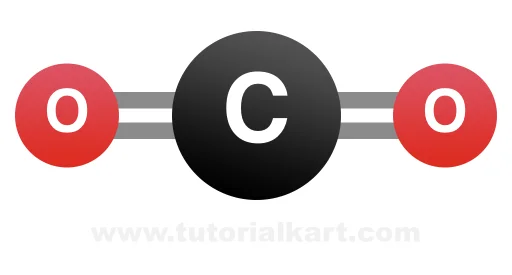Answer: Molar mass of carbon dioxide (CO2) is 44.01 g/mol.
Molar Mass of Carbon Dioxide
The chemical formula of Carbon dioxide is CO2. The molar mass of carbon dioxide is calculated by adding the molar masses of its constituent atoms — carbon (C) and oxygen (O).

In this guide, we will walk through the steps involved in calculating the molar mass of carbon dioxide and its relevance in chemistry.
Understanding Molar Mass
Molar mass refers to the mass of one mole of a given substance, expressed in grams per mole (g/mol). A mole represents \(6.022 \times 10^{23}\) particles, whether they are atoms, molecules, or ions. The molar mass of a compound is determined by adding the molar masses of all the atoms in its molecular structure.
To calculate the molar mass of CO2, we need to add the molar masses of carbon (C) and oxygen (O), which are readily available on the periodic table. Let’s proceed with the calculation by using the appropriate atomic weights for carbon and oxygen.
Molar Masses of Carbon and Oxygen
To calculate the molar mass of carbon dioxide, we need the molar masses of its constituent atoms:
- Carbon (C): The molar mass of carbon is approximately 12.01 g/mol.
- Oxygen (O): The molar mass of oxygen is approximately 16.00 g/mol.
Since a carbon dioxide molecule contains one carbon atom and two oxygen atoms, these values will be used in our calculation.
Formula for Calculating Molar Mass
The molar mass of a compound can be calculated using the following formula:
\[ \text{Molar Mass of Compound} = \sum (\text{Number of Atoms} \times \text{Molar Mass of Element}) \]
For carbon dioxide (CO2), the formula becomes:
\[ \text{Molar Mass of CO}_2 = (1 \times \text{Molar Mass of C}) + (2 \times \text{Molar Mass of O}) \]
Step-by-Step Calculation
Let’s now calculate the molar mass of carbon dioxide by following these steps:
Step 1: Multiply the molar mass of carbon (C) by the number of carbon atoms in a carbon dioxide molecule. Since there is one carbon atom, the calculation is:
\[ 1 \times 12.01 \, \text{g/mol} = 12.01 \, \text{g/mol} \]
Step 2: Multiply the molar mass of oxygen (O) by the number of oxygen atoms in a carbon dioxide molecule. Since there are two oxygen atoms, the calculation is:
\[ 2 \times 16.00 \, \text{g/mol} = 32.00 \, \text{g/mol} \]
Step 3: Add the molar masses from steps 1 and 2 to find the total molar mass of carbon dioxide:
\[ \text{Molar Mass of CO}_2 = 12.01 \, \text{g/mol} + 32.00 \, \text{g/mol} \]
\[ \text{Molar Mass of CO}_2 = 44.01 \, \text{g/mol} \]
Final Molar Mass of Carbon Dioxide
The molar mass of carbon dioxide (CO2) is approximately 44.01 g/mol. This means that one mole of carbon dioxide molecules weighs 44.01 grams. Understanding the molar mass of carbon dioxide is crucial in various chemical calculations, such as determining how much CO2 is produced in a reaction or calculating the mass of CO2 in a given volume of gas.
Conclusion
The molar mass of carbon dioxide (CO2) is approximately 44.01 g/mol, calculated by summing the molar masses of one carbon atom and two oxygen atoms. This value is essential for many chemical and environmental calculations, such as understanding gas behavior, balancing chemical equations, and determining the impact of CO2 in the atmosphere.
